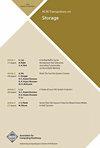使用WOM-v码提高下一代SSD的耐久性
IF 2.6
3区 计算机科学
Q3 COMPUTER SCIENCE, HARDWARE & ARCHITECTURE
引用次数: 0
摘要
高密度固态驱动器,如QLC驱动器,提供了更大的存储容量,但大大降低了程序和擦除(P/E)周期,限制了它们的耐用性和可用性。我们提出了非二进制,基于电压的写一次存储器(WOM-v)代码的设计和实现,以提高QLC驱动器的使用寿命。首先,我们开发了一个基于FEMU的模拟器测试平台,以评估WOM-v代码在现实世界工作负载上的增益。其次,我们提出并实现了两项优化,一种有效的垃圾收集机制和一种编码优化,以在不影响性能的情况下大幅提高WOM-v的代码耐久性。第三,我们提出了分析方法来估计WOM-v代码下的续航增益。在WOM-v代码环境下,分析了具有均匀页访问分布的贪婪垃圾收集技术和具有倾斜页访问分布的最近最少写入(LRW)垃圾收集技术。我们发现,尽管这两种方法都高估了所需擦除操作的数量,但基于统一页面访问分布的贪婪垃圾收集模型提供了更严格的边界。仔细的评估,包括微基准测试和跟踪驱动评估,表明WOM-v代码可以减少QLC驱动器的擦除周期4.4×-11.1×,以最小的性能开销,从而提高QLC SSD的使用寿命。本文章由计算机程序翻译,如有差异,请以英文原文为准。
Improving the Endurance of Next Generation SSD’s using WOM-v Codes
High density Solid State Drives, such as QLC drives, offer increased storage capacity, but a magnitude lower Program and Erase (P/E) cycles, limiting their endurance and hence usability. We present the design and implementation of non-binary, Voltage-Based Write-Once-Memory (WOM-v) Codes to improve the lifetime of QLC drives. First, we develop a FEMU based simulator test-bed to evaluate the gains of WOM-v codes on real world workloads. Second, we propose and implement two optimizations, an efficient garbage collection mechanism and an encoding optimization to drastically improve WOM-v code endurance without compromising performance. Third, we propose analytical approaches to obtain estimates of the endurance gains under WOM-v codes. We analyze the Greedy garbage collection technique with uniform page access distribution and the Least Recently Written (LRW) garbage collection technique with skewed page access distribution in the context of WOM-v codes. We find that although both approaches overestimate the number of required erase operations, the model based on greedy garbage collection with uniform page access distribution provides tighter bounds. A careful evaluation, including microbenchmarks and trace-driven evaluation, demonstrates that WOM-v codes can reduce Erase cycles for QLC drives by 4.4×–11.1× for real world workloads with minimal performance overheads resulting in improved QLC SSD lifetime.
求助全文
通过发布文献求助,成功后即可免费获取论文全文。
去求助
来源期刊

ACM Transactions on Storage
COMPUTER SCIENCE, HARDWARE & ARCHITECTURE-COMPUTER SCIENCE, SOFTWARE ENGINEERING
CiteScore
4.20
自引率
5.90%
发文量
33
审稿时长
>12 weeks
期刊介绍:
The ACM Transactions on Storage (TOS) is a new journal with an intent to publish original archival papers in the area of storage and closely related disciplines. Articles that appear in TOS will tend either to present new techniques and concepts or to report novel experiences and experiments with practical systems. Storage is a broad and multidisciplinary area that comprises of network protocols, resource management, data backup, replication, recovery, devices, security, and theory of data coding, densities, and low-power. Potential synergies among these fields are expected to open up new research directions.
 求助内容:
求助内容: 应助结果提醒方式:
应助结果提醒方式:


